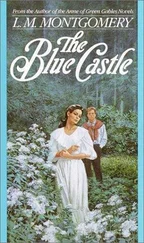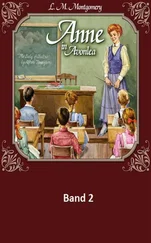"I began it last spring. I called it The White Lady first but now I've changed it to The Child of the Sea. Don't you think that's a better title?”
"Much better.”
"I've got three cantos done, and I can't get any further because there's something I don't know and can't find out. I've been so worried about it.”
"What is it?”
"My epic," said Emily, diligently devouring plum cake, "is about a very beautiful high-born girl who was stolen away from her real parents when she was a baby and brought up in a woodcutter's hut.”
"One av the seven original plots in the world," murmured Father Cassidy.
"What?”
"Nothing. Just a bad habit av thinking aloud. Go on.”
"She had a lover of high degree but his family did not want him to marry her because she was only a woodcutter's daughter ... “
"Another of the seven plots — excuse me.”
" — so they sent him away to the Holy Land on a crusade and word came back that he was killed and then Editha — her name was Editha — went into a convent ... “Emily paused for a bite of plum cake and Father Cassidy took up the strain.
"And now her lover comes back very much alive, though covered with Paynim scars, and the secret av her birth is discovered through the dying confession av the old nurse and the birthmark on her arm.”
"How did you know?" gasped Emily in amazement.
"Oh, I guessed it — I'm a good guesser. But where's your bother in all this?”
"I don't know how to get her out of the convent," confessed Emily.
"I thought perhaps you would know how it could be done.”
Again Father Cassidy fitted his fingers.
"Let us see, now. It's no light matter you've undertaken, young lady. How stands the case? EDITHA has taken the veil, not because she has a religious vocation but because she imagines her heart is broken. The Catholic Church does not release its nuns from their vows because they happen to think they've made a little mistake av that sort. No, no — we must have a better reason. Is this Editha the sole child av her real parents?”
"Yes.”
"Oh, then the way is clear. If she had had any brothers or sisters you would have had to kill them off, which is a messy thing to do.
Well, then, she is the sole daughter and heiress av a noble family who have for years been at deadly feud with another noble family — the family av the lover. Do you know what a feud is?”
"Of course," said Emily disdainfully. "And I've got all that in the poem already.”
"So much the better. This feud has rent the kingdom in twain and can only be healed by an alliance between Capulet and Montague.”
"Those aren't their names.”
"No matter. This, then, is a national affair, with far-reaching issues, therefore an appeal to the Supreme Pontiff is quite in order. What you want," Father Cassidy nodded solemnly, "is a dispensation from Rome.”
"Dispensation is a hard word to work into a poem," said Emily.
"Undoubtedly. But young ladies who WILL write epic poems and who WILL lay the scenes thereof amid times and manners av hundreds av years ago, and WILL choose heroines of a religion quite unknown to them, MUST expect to run up against a few snags.”
"Oh, I think I'll be able to work it in," said Emily cheerfully.
"And I'm so much obliged to you. You don't know what a relief it is to my mind. I'll finish the poem right up now in a few weeks.
I haven't done a thing at it all summer. But then of course I've been busy. Ilse Burnley and I have been making a new language.”
"Making a — new — excuse me. DID you say LANGUAGE?”
"Yes.”
"What's the matter with English? Isn't it good enough for you, you incomprehensible little being?”
"Oh, yes. THAT isn't why we're making a new one. You see in the spring, Cousin Jimmy got a lot of French boys to help plant the potatoes. I had to help too, and Ilse came to keep me company.
And it was so annoying to hear those boys talking French when we couldn't understand a word of it. They did it just to make us mad.
Such jabbering! So Ilse and I just made up our minds we'd invent a new language that THEY couldn't understand. We're getting on fine and when the potato picking time comes we'll be able to talk to each other and those boys won't be able to understand a word we're saying. Oh, it will be great fun!”
"I haven't a doubt. But two girls who will go to all the trouble av inventing a new language just to get square with some poor little French boys — you're beyond me," said Father Cassidy, helplessly. "Goodness knows what you'll be doing when you grow up.
You'll be Red Revolutionists. I tremble for Canada.”
"Oh, it isn't a trouble — it's fun. And all the girls in school are just wild because they hear us talking in it and can't make it out.
We can talk secrets right before them.”
"Human nature being what it is, I can see where the fun comes in all right. Let's hear a sample av your language.”
"Nat millan O ste dolman bote ta Shrewsbury fernas ta poo litanos,” said Emily glibly. "That means, 'Next summer I am going to Shrewsbury woods to pick strawberries.' I yelled that across the playground to Ilse the other day at recess and oh, how everybody stared.”
"Staring, is it? I should say so. My own poor old eyes are all but dropping out av me head. Let's hear a bit more av it.”
"Mo tral li dead seb ad li mo trene. Mo bertral seb mo bertrene das sten dead e ting setra. THAT means 'My father is dead and so is my mother. My grandfather and grandmother have been dead a long time." We haven't invented a word for 'dead' yet. I think I will soon be able to write my poems in our language and then Aunt Elizabeth will not be able to read them if she finds them.”
"Have you written any other poetry besides your epic?”
"Oh, yes — but just short pieces — dozens of them.”
"H'm. Would you be so kind as to let me hear one av them?”
Emily was greatly flattered. And she did not mind letting Father Cassidy hear her precious stuff.
"I'll recite my last poem," she said, clearing her throat importantly. "It's called Evening Dreams.”
Father Cassidy listened attentively. After the first verse a change came over his big brown face, and he began patting his finger tips together. When Emily finished she hung down her lashes and waited tremblingly. What if Father Cassidy said it was no good? No, he wouldn't be so impolite — but if he bantered her as he had done about her epic — she would know what THAT meant.
Father Cassidy did not speak all at once. The prolonged suspense was terrible to Emily. She was afraid he could not praise and did not want to hurt her feelings by dispraise. All at once her "Evening Dreams" seemed trash and she wondered how she could ever have been silly enough to repeat it to Father Cassidy.
Of course, it WAS trash. Father Cassidy knew that well enough.
All the same, for a child like this — and rhyme and rhythm were flawless — and there was one line — just one line — "the light of faintly golden stars" — for the sake of that line Father Cassidy suddenly said, "Keep on — keep on writing poetry.”
"You mean — ?" Emily was breathless.
"I mean you'll be able to do something by and by. Something — I don't know how much — but keep on — keep on.”
Emily was so happy she wanted to cry. It was the first word of commendation she had ever received except from her father — and a father might have too high an opinion of one. THIS was different.
To the end of her struggle for recognition Emily never forgot Father Cassidy's "Keep on" and the tone in which he said it.
"Aunt Elizabeth scolds me for writing poetry," she said wistfully.
"She says people will think I'm as simple as Cousin Jimmy.”
"The path of genius never did run smooth. But have another piece av cake — do, just to show there's something human about you.”
Читать дальше


